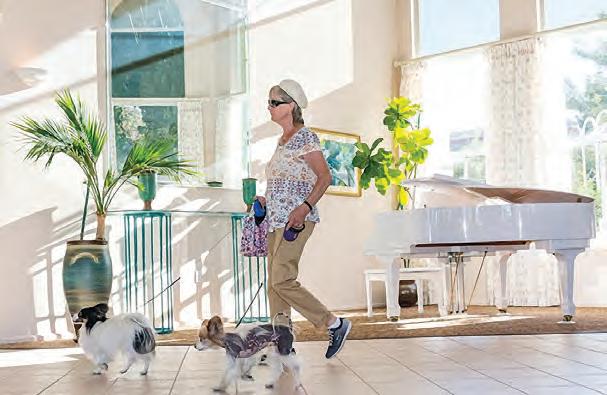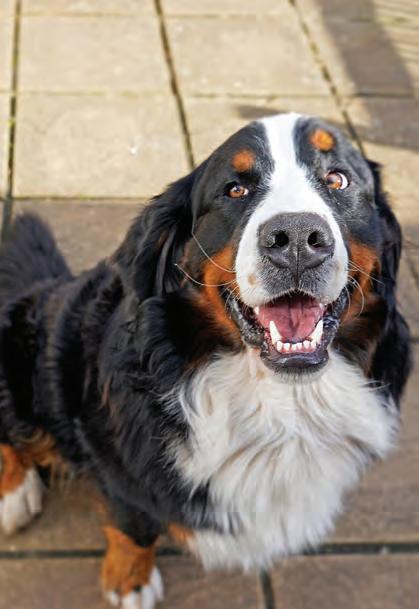
4 minute read
Know the Laws That Impact Your Pet
Be
By Teresa Bitler
Advertisement
Your dog comes with legal obligations. As his owner, you are required to keep his rabies vaccinations current and maintain his license. You also must control your dog in public and, depending on where you live, pick up his waste on walks. But that’s just the beginning. Laws and regulations can protect other people from your dog, protect your rights as a dog owner, and even protect your dog from harm.
That’s why it’s so important to be aware of the current laws regarding pets, according to Ledy VanKavage, the senior legislative attorney for Best Friends Animal Society. Existing laws and those in the works can potentially affect everything from safety measures at the facility where you board your dog to whether the local shelter has to scan for a microchip if your lost dog turns up there.
Current laws and regulations
In Arizona, the laws that apply to your dog may not be as extensive as you think. Besides rabies vaccination and licensing requirements, state law addresses animal cruelty, animal hoarding, and service animals. It also makes you responsible for injuries your dog causes and stipulates where your dog must quarantine and for how long after a bite.
But what the law doesn’t cover may surprise you. For example, while your hairstylist needs a license to cut your hair, your dog’s groomer doesn’t need one to cut his. In fact, a groomer doesn’t even need to meet certain educational requirements. On-the-job training suffices. Similarly, someone who runs a kennel only needs to pay $75 for a permit issued by the county board of supervisors. Nothing more. And, no laws regulate dog walkers and pet sitters.
Even dog rescue organizations aren’t licensed or regulated in the state of Arizona. VanKavage says that although it would be a good idea to have some oversight of rescues and shelters, you have to balance that with the fact that these are people who are trying to save animals and find them new homes.
“We don’t want it to be overly burdensome,” she says. However, she believes it would be helpful if rescues had to report statistics, such as how many dogs they rescued.
Arizona State Representative John Kavanagh (R), Fountain Hills, agrees and is considering a bill that would require shelters and rescues to meet predetermined procedural and medical standards. However, he anticipates such a bill would face opposition at the county level since it would increase the counties’ workloads.
Meanwhile, in an effort to raise the standards of rescue organizations, PACC911, Phoenix Animal Care Coalition, has established a set of Best Practices for rescues to use as a guide. Having vetted over 120 rescues, referred to as PACC911 Partners, qualifiers must be a 501(c)(3), have liability insurance, and conduct themselves in a professional manner. By adhering to those practices, as well as committing to PACC911’s Code of Ethics, Partners are then eligible for assistance and an assortment of program benefits.

What’s on the docket
Kavanagh, who spearheads much of the humane legislation within the state, already has several humane bills working their way through the legislature. The most significant—and the most likely to pass—would prevent insurance companies from denying homeowners or renters insurance coverage based on the breed of dog you own. Known commonly as the breed discrimination bill, House Bill 2323 is on the state’s dockets for 2022 and faces little opposition at this point.
“The focus should be on behavior, not breed,” VanKavage points out.“There’s no research that proves one breed is more prone to aggression than any other breed.”
She notes that breed discrimination laws passed in Nevada and New York last year were a big win for dogs, because when an owner can’t get homeowners’ insurance, they often have to surrender their pet. As a result, more dogs wind up in shelters and rescues.
Kavanagh also anticipates HB 2626 will pass this year. This bill would require animal shelters, veterinarians contracted by the state, and anyone who removes deceased animals from public lands to thoroughly scan an animal for a microchip. Currently, if your lost dog ends up at a county shelter, staff doesn’t have to scan them for a microchip. As a result, they wouldn’t be able to notify you he’s there. It’s the same when your pet is hit by a car. You may never find out what happened to him. HB 2626 would change that.
Pet owners will also want to take note of HB 2224, which would ban cat declawing statewide. Kavanagh, who co-sponsors the bill with State Representative Amish Shah (D), Phoenix, admits this bill faces some challenges, including opposition from the American Veterinary Association. However, public support could have an impact.
How to advocate for your dog
As a pet owner, it’s important to be aware of humane bills coming up for a vote in your state legislature, according to
LAWS continues on page 24
LAWS continued from page 23
VanKavage. When issues that affect your pet come up, you can advocate on their behalf. She says one of the best ways to find out which humane bills are working their way through the legislative process in your state is to visit BestFriends. org/Action. You can also visit the Animal Defense League of Arizona’s (ADLA) website and read about relevant legislation under “Legislative News.” Kavanagh has his own website, humaneanimallaws.com.
To make a difference, you’ll need to first know who your two state representatives and senator are, according to the ADLA. You can find out at azleg.gov/findmylegislator. Once you know their names, reach out. Thank them for serving your district, let them know you vote in their district, and let them know you are happy to be a resource to them. VanKavage suggests volunteering to work on their behalf, because they’ll be more likely to listen to you when you have concerns about a specific bill or have ideas for a bill you’d like to see them sponsor.
Laws can have a major impact on the quality of animals’ lives, whether they end up in shelters, and their safety, according to VanKavage. By following humane bills making their way through your state’s legislature, you can affect the life not only of your pet, but animals throughout the state.



Teresa Bitler wanted to be a veterinarian until she found out how much science was involved. Today, she’s a freelance writer whose work has appeared in National Geographic Traveler, USA TODAY 10Best, and various other outlets.















